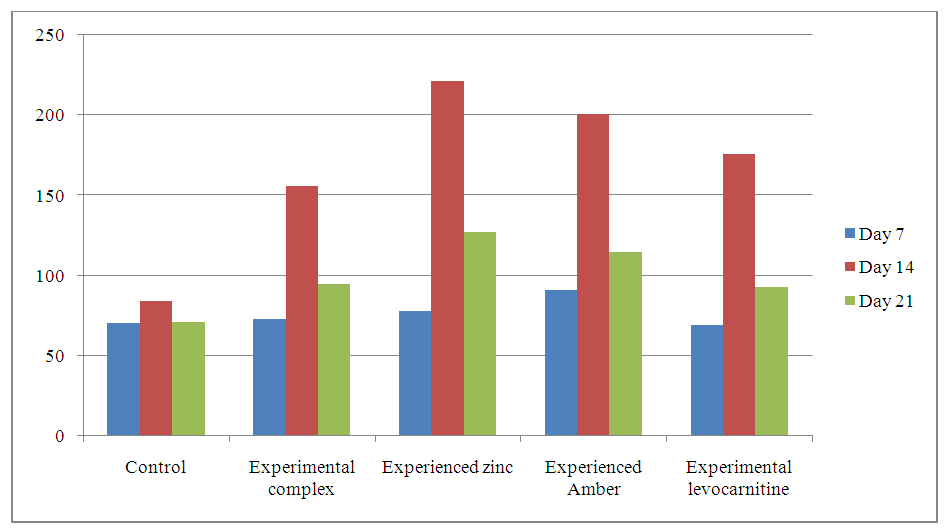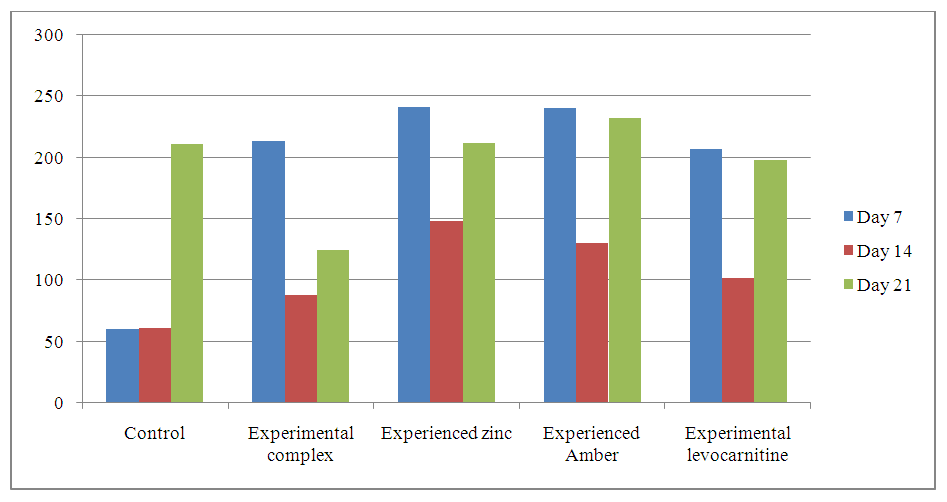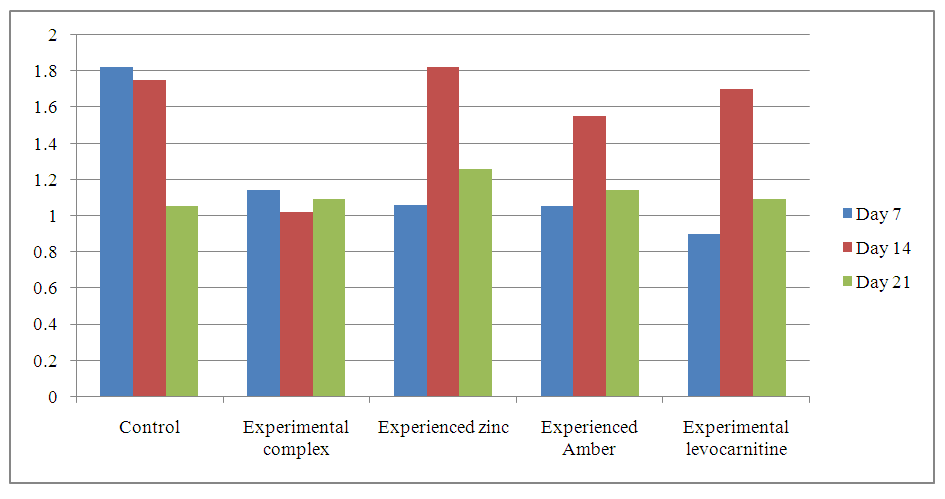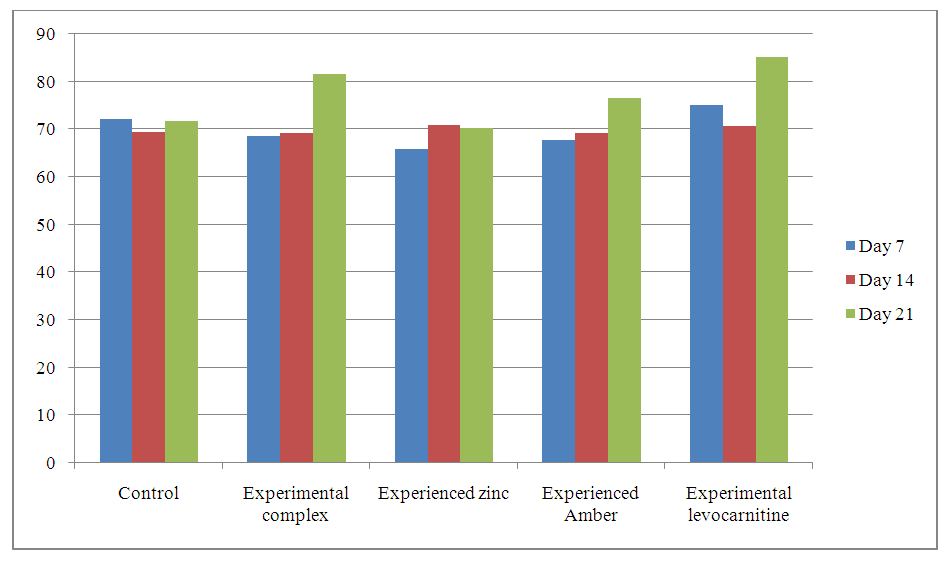-
Paper Information
- Next Paper
- Previous Paper
- Paper Submission
-
Journal Information
- About This Journal
- Editorial Board
- Current Issue
- Archive
- Author Guidelines
- Contact Us
American Journal of Medicine and Medical Sciences
p-ISSN: 2165-901X e-ISSN: 2165-9036
2025; 15(6): 1791-1795
doi:10.5923/j.ajmms.20251506.32
Received: May 4, 2025; Accepted: May 26, 2025; Published: Jun. 7, 2025

An Experimental Investigation of Biochemical Alterations in Rat Blood Induced by a Dietary Supplement Complex
Fotiev S. S.
Republican Scientific and Practical Center of Sports Medicine under the National Olympic Committee of the Republic of Uzbekistan
Correspondence to: Fotiev S. S., Republican Scientific and Practical Center of Sports Medicine under the National Olympic Committee of the Republic of Uzbekistan.
| Email: |  |
Copyright © 2025 The Author(s). Published by Scientific & Academic Publishing.
This work is licensed under the Creative Commons Attribution International License (CC BY).
http://creativecommons.org/licenses/by/4.0/

The aim of this study was to investigate the impact of a complex of amino acids and trace elements, including Arginine, Lysine, L-Carnitine, and Zinc (succinate), on biochemical blood parameters in non-pedigreed rats. The study focused on evaluating changes in key parameters such as cholesterol levels, ALT (alanine aminotransferase) and AST (aspartate aminotransferase) activity, and total blood protein, which reflect liver function. The experiment was conducted in three stages (7, 14, and 21 days) using standardized methods of biochemical analysis. The results showed that the supplements significantly affected metabolic processes, particularly in the liver, increasing ALT and AST levels, and regulating lipid metabolism (cholesterol). The supplement complex had a positive impact on the total protein content in the blood, indicating support for protein metabolism. The obtained data can be used for developing recommendations for the use of this supplement complex in veterinary practice and the prevention of metabolic diseases.
Keywords: Аmino acids, Trace elements, Arginine, Lysine, L-Carnitine, Zinc, Biochemical blood parameters, ALT, AST, Cholesterol, Protein metabolism, Metabolic processes, Liver, Experimental study
Cite this paper: Fotiev S. S., An Experimental Investigation of Biochemical Alterations in Rat Blood Induced by a Dietary Supplement Complex, American Journal of Medicine and Medical Sciences, Vol. 15 No. 6, 2025, pp. 1791-1795. doi: 10.5923/j.ajmms.20251506.32.
Article Outline
1. Introduction
- In recent years, there has been a noticeable and sustained increase in interest in dietary supplements (DS) among athletes of all levels - from amateurs to professionals [1]. This trend is reflected in the growing number of online searches, discussions on sports forums, and, notably, in the increasing sales volumes of such products. The heightened attention stems from athletes' desire to optimize their training routines, achieve peak performance, and accelerate recovery following intense physical exertion. When used appropriately and with awareness, these supplements can indeed exert a wide range of effects on the body, going far beyond the simple replenishment of micronutrient deficiencies [2,3]. They support key metabolic processes, such as improving protein and carbohydrate absorption, stimulating muscle tissue synthesis, and enhancing cardiovascular function.One particularly important area is post-exercise recovery. DS can help reduce muscle soreness, minimize inflammation, and speed up the regeneration of damaged tissues, enabling athletes to return to full training more quickly. Furthermore, overall physical performance can also be enhanced — for instance, supplements containing adaptogens help the body cope with stress factors associated with intense training and competition, thereby increasing resistance to fatigue and improving concentration [4].A crucial aspect of health, especially relevant to athletes, is the maintenance of normal liver function [5]. The liver is a multifunctional organ that plays a central role in metabolism, detoxification, and energy provision for muscular activity. It processes nutrients from food, synthesizes essential proteins and enzymes, and neutralizes toxins produced during metabolism or entering from the external environment [6]. Athletes place particular strain on the liver due to intensive training and the use of certain supplements (such as amino acid complexes or steroidal compounds), which may increase toxin production and raise the risk of liver cell damage. Impaired liver function may manifest as fatigue, reduced appetite, jaundice of the skin and mucous membranes, and decreased athletic performance [7]. Thus, maintaining liver health is not merely about disease prevention - it is a critical factor influencing training effectiveness and an athlete’s overall well-being. Some DS include components that support liver function, such as silymarin (milk thistle extract), artichoke, curcumin, and others, which have antioxidant and hepatoprotective properties [8].Among the most promising components used in DS are amino acids - the building blocks of proteins, essential for tissue growth, repair, and hormone synthesis. Arginine, for example, plays a key role in nitric oxide synthesis, which regulates vascular tone and improves circulation, and is also involved in detoxification [9]. Lysine is essential for calcium absorption and immune system support [10]. L-carnitine, a key player in fat metabolism, aids in transporting fatty acids into mitochondria, where they are utilized for energy production [11]. In addition to amino acids, trace elements are vital for maintaining animal health. Zinc, especially in the form of succinate, exhibits strong antioxidant properties, protects cells from free radical damage, and helps normalize liver function. Zinc succinate also enhances the absorption of other nutrients and supports immune function [12].The effects of this complex of amino acids and trace elements - including arginine, lysine, L-carnitine, and zinc (succinate) - on metabolism and the functional state of organs, particularly the liver, have been confirmed by several studies. As a vital metabolic organ, the liver plays a key role in detoxification, protein synthesis, and regulation of blood glucose levels. Impairments in liver function can lead to serious health consequences in animals.
2. Purpose of the Research
- The aim of our study was to conduct a more detailed investigation of the effects of this amino acid and trace element complex - comprising arginine, lysine, L-carnitine, and zinc (succinate) - on the biochemical parameters of blood in outbred rats, a widely used model in scientific research due to their physiological similarity to other mammals and ease of maintenance. We sought to assess how the inclusion of this complex in the diet influences key indicators reflecting liver function, such as cholesterol levels, ALT (alanine aminotransferase), and AST (aspartate aminotransferase), as well as total blood protein composition and other important metabolic markers. The data obtained will allow us to draw conclusions regarding the potential benefits of this amino acid and trace element complex for supporting health and improving the overall condition of animals.
3. Materials and Methods
- The experiment was conducted on outbred male rats weighing 200 ± 20 grams, all of which underwent a mandatory two-week quarantine prior to the start of the study. All animals were housed under standard laboratory conditions, with care and feeding procedures carried out in accordance with established regulatory guidelines.The animals were randomly assigned to the following experimental groups:• Control group: received a basic diet without any supplements.• Experimental groups I–IV: each group received specific dietary supplements consisting of various combinations of agents affecting metabolism and liver function.Housing conditions and duration of the experiment: All groups were maintained under identical environmental and dietary conditions throughout the duration of the study, which was conducted over three phases — on days 7, 14, and 21.To assess the physiological status of the animals, the following key biochemical parameters of blood serum were analyzed:• ALT (alanine aminotransferase) – an enzyme reflecting amino acid metabolism and liver cell damage.• AST (aspartate aminotransferase) – similarly indicates hepatocellular damage and the degree of systemic intoxication.• Cholesterol – a primary indicator of lipid metabolism and an important cardiovascular risk factor.• Total protein – a marker of the plasma protein profile, indicating the level of proteins synthesized by the liver.The analysis was performed using standardized quantitative methods for enzyme and metabolite determination in the biochemical blood profile. Automated laboratory systems and commercially available reagent kits from leading manufacturers were utilized.Thus, the methods employed ensured high accuracy and reproducibility of results in evaluating the effects of dietary supplements on key health indicators in laboratory animals.
4. Results and Discussion
- The study revealed that the supplements (zinc, succinate, L-carnitine, and the combined complex) had a significant effect on ALT levels in the blood of rats. On day 7, a moderate upward trend in ALT levels was observed in the experimental groups, particularly in the zinc group (+1.10 times) and the succinate group (+1.29 times), which is likely associated with the activation of hepatic metabolic processes. In the L-carnitine group, a slight decrease in ALT was recorded (–0.02 times).By day 14, the increase in ALT levels was most pronounced in the group receiving the combined supplement complex (+1.85 times), as well as in the zinc (+2.62 times) and succinate (+2.38 times) groups. This suggests a more active stimulation of liver enzymatic activity in response to these substances.On day 21, ALT levels remained elevated in most experimental groups, with the highest values found in the zinc group (+1.78 times) and the combined supplement group (+1.33 times). These findings indicate a sustained effect of these supplements on hepatic metabolic processes (Figure 1).
 | Figure 1. Changes in ALT activity in blood under experimental exposure to various substances |
 | Figure 2. Changes in AST activity in blood under experimental exposure to various substances |
 | Figure 3. Changes in cholesterol activity in blood under experimental exposure to various substances |
 | Figure 4. Changes in total protein activity in blood under experimental exposure to various substances |
5. Conclusions
- The results of the experiment demonstrate that supplements containing arginine, lysine, L-carnitine, and zinc have a noticeable effect on biochemical blood parameters in rats. The most pronounced changes were observed in the levels of ALT, AST, and cholesterol, indicating an active influence of these substances on metabolic processes, particularly in the liver. The use of the supplement complex led to an increase in total protein levels in the blood, suggesting a positive effect on protein metabolism. The obtained results can be used to develop recommendations for the use of these supplements in veterinary practice and possibly in the prevention of metabolic diseases in animals.
 Abstract
Abstract Reference
Reference Full-Text PDF
Full-Text PDF Full-text HTML
Full-text HTML